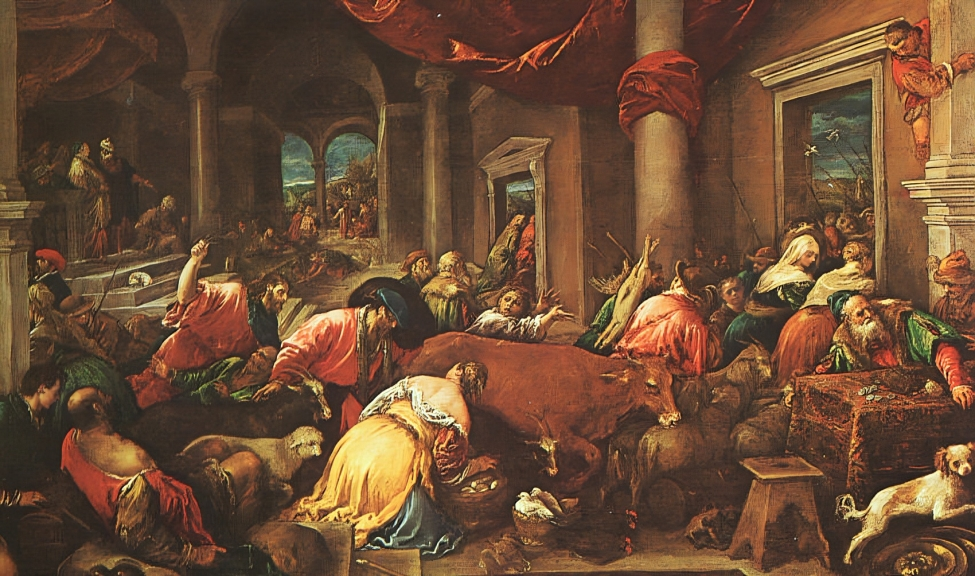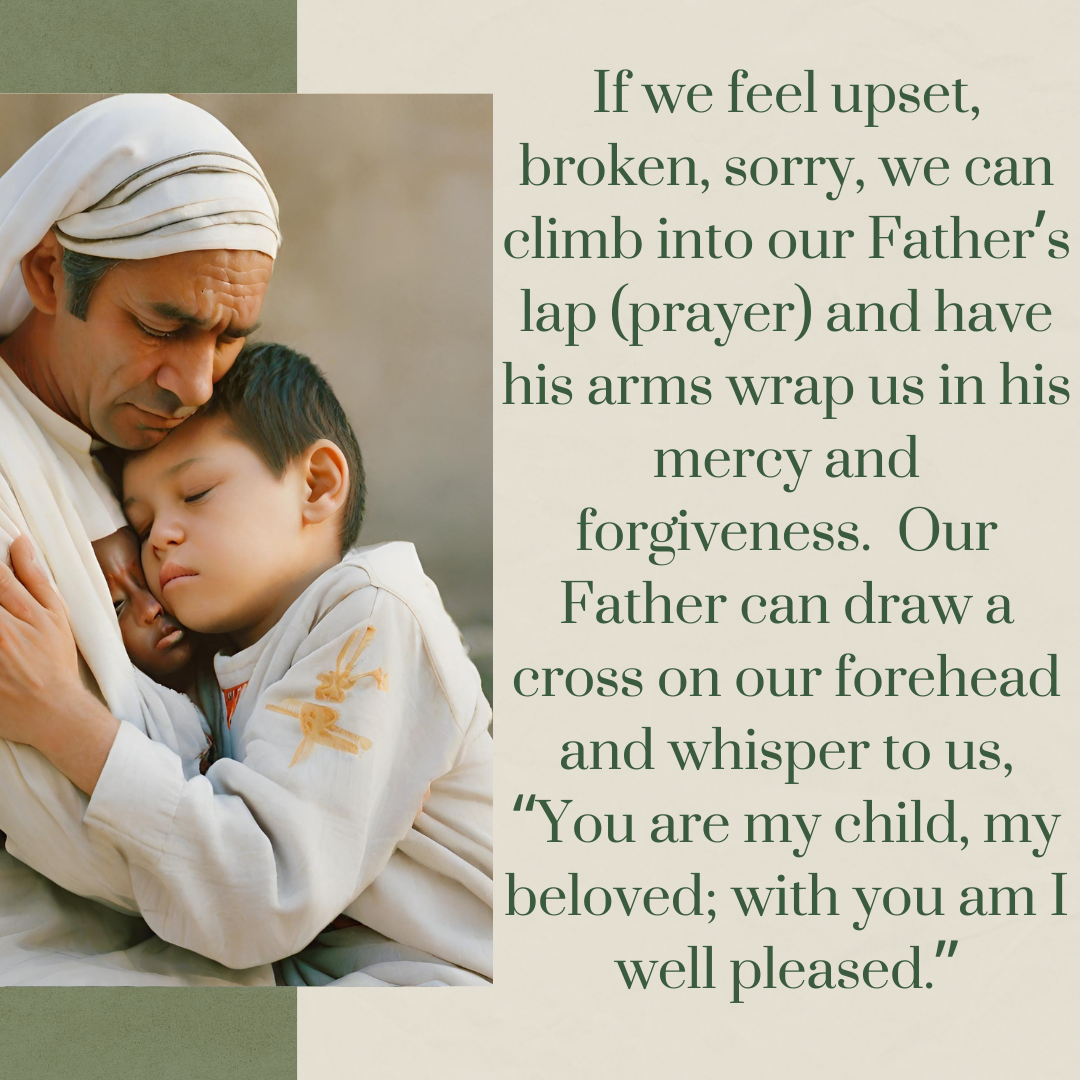IT’S OUR FATHER’S HOUSE
John 2:13-22
Third Sunday in Lent, Year B
Analysis by Timothy Hoyer
13The Passover of the Jews was near, and Jesus went up to Jerusalem. 14In the temple he found people selling cattle, sheep, and doves, and the money changers seated at their tables. 15Making a whip of cords, he drove all of them out of the temple, both the sheep and the cattle. He also poured out the coins of the money changers and overturned their tables. 16He told those who were selling the doves, “Take these things out of here! Stop making my Father’s house a marketplace!” 17His disciples remembered that it was written, “Zeal for your house will consume me.” 18The Jews then said to him, “What sign can you show us for doing this?” 19Jesus answered them, “Destroy this temple, and in three days I will raise it up.” 20The Jews then said, “This temple has been under construction for forty-six years, and will you raise it up in three days?” 21But he was speaking of the temple of his body. 22After he was raised from the dead, his disciples remembered that he had said this; and they believed the scripture and the word that Jesus had spoken.

Jacopo da Ponte – The Purification of the Temple
From Wikimedia Commons
Our worth is that Jesus brings us to his Father as the people he died for, not as people whose worth is based on money.
DIAGNOSIS: The World Is Like a Store
Step 1: Initial Diagnosis (External Problem): Everything Has A Price
Grounding: The temple had become a store. The place reserved for God had become a place rented to vendors. Prayers had been replaced by purchasing. The quiet meant for healing the heart was wrecked by people hawking their wares. The way humanity dealt with their daily affairs – bartering, buying, selling – now intruded into how God dealt with people. God’s way of forgiving people was being sold instead of graced.
Tracking: We make life into a store. We put a price on everything. We put a price on people. We pay people what their work is worth (though that is the wrong reason to pay them). We have economies based on consumerism – buying things and more things. And as we put a price on people, we treat them according to that price. We rave about the rich but punish people because they are poor because we pay them poorly. Our way of living in a store intrudes into our relationships. Our way of being neighbors and family is now based on what they can pay us instead of being based on kindness.
Step 2: Advanced Diagnosis (Internal Problem): We Buy Into Paying As How To Live
Grounding: The cattle, sheep, and doves were sold in the temple plaza as a convenience for people coming to the temple to offer a sacrifice. It was easier to buy the sacrifice at the temple than to bring it all the way from home and have to feed it on the way. Scripture, what was written by Moses, gave directions for sacrifices and what they were for. So, sacrifices had a holy source and basis for why they were done. People put their faith in those instructions and in the sacrifices. They were the means to set things right between them and God.
Tracking: As we live as if we were in a store where all we do has a price on it, we use buying as our way to deal with the events in which we hurt others. We trust it is the way to function and deal with one another. We don’t even question it or doubt it. We insist that we have to pay for our mistakes. We have to “make up” for what we did wrong. We have to buy gifts (flowers, dinner out) to assuage hurt feelings and to buy our way back into the other person’s acceptance. Or we buy our way back in by doing extra work – a special meal, a cleaned-out basement, a clean house. We have to satisfy the person we hurt so they relate to us in a kind way again. (The Lutheran Confessions calls them “merits and satisfactions.” They are the means we earn our place with the other person. That person can abuse the situation by never being satisfied and always demanding more payment.
Step 3: Final Diagnosis (Eternal Problem): God Demands Payment
Grounding: Those in charge at the temple demanded proof from Jesus, a sign, that showed he had been assigned the task of cleaning out the temple. He couldn’t disrupt how God wanted things done on his own authority. His authority had no worth compared to God’s authority. It was God who demanded payment, who even demanded the payment of people’s lives for their failure to trust God.
Tracking: We trust that living in a store is how life is supposed to be. We trust it is our only option, the only way to exist. It’s how things are meant to be. The way of the store is the only way we can think. The way of the store is our god. We know that no one has enough money to buy more time, to buy a longer life. But we don’t think about it or complain. It’s the way of the store and there is no changing it. We grieve the death of those we love, and then we are told death is just a part of life (the store).
PROGNOSIS: Jesus Raised Up A New Home For Us
Step 4: Initial Prognosis (Eternal Solution): Jesus Offers Grace
Grounding: Jesus will raise up the temple in three days. God raising him from death is his proof to get rid of the marketplace and make it his Father’s house. Being raised from death is not an item the store has on its shelves. Jesus being raised from death is the start of a new creation, a new life, a new place, where there is no store. Jesus makes the temple his Father’s house, a place where we are his Father’s children, not customers; where his Father loves us instead of asking if we have proof we can pay; where our worth is that Jesus brings us to his Father as the people he died for, not as people whose worth is based on money. Jesus really makes a new creation.
Crossing: Jesus’ resurrection is proclaimed to us. That is how we are given the chance to see what he has done for us. Jesus’ overcoming death is his overcoming of the store – his driving out of the cattle, sheep, doves, and money changers. The way of buying and selling is cast aside so that we know we now have his Father’s house to live in instead of the store. Instead of buying and selling, Jesus gives us his grace – gifts free of price. Instead of us having to pay for our wrongs, Jesus gives us forgiveness.
Step 5. Advanced Prognosis (External Solution): We Are Given Trust in Jesus
Grounding: Those who challenged Jesus’s authority to make the temple his Father’s house did not accept his authority (though we can understand how they didn’t understand that Jesus was referring to himself as the temple). But what did all the people who came to the temple after it was cleaned-out think of the quiet and the peace and Jesus sitting there to welcome them into his Father’s house? The quiet and the peace were a gift to be accepted. It was a gift to be trusted and lived in.
Crossing: Jesus’ gift of forgiveness is what we receive. It is a gift to be trusted and lived in. Jesus even gives us trust to trust him and his gift. His giving, his grace, relieves us of untold stress. Gone are the stresses of: “Can we afford it? How much can we pay per month? Am I good enough? Where did I go wrong? Does God care about me?” In the midst of the store’s commotion and the shouting of advertisements, we have Jesus’ peace and quiet.
Step 6: Final Prognosis (External Solution): Everything In Jesus Is A Gift
Grounding: It was “after he was raised from the dead” that the disciples realized that Jesus had promised them life in his Father’s house when he had cleared-out the temple. The quiet of the temple was a new way to be in the temple. They could remember the Scripture, “I take no pleasure in your burnt offerings.” “The sacrifice acceptable to God is a broken spirit; a broken and contrite heart, O God, you will not despise” (Psalm 51.17). That did not mean people had to have a broken spirit, but that they already had a broken spirit, and had come to the temple to be healed, forgiven, consoled, comforted, and strengthened. They did not have to pretend that they felt fine or okay. They did not have to pay by looking strong and pretending all was well.
Crossing: Stores do not like customers who look like they have no money. Stores want customers who look happy and prosperous and with money to spend. But now we live in our Father’s house. If we feel upset, broken, sorry, we can climb into our Father’s lap (prayer) and have his arms wrap us in his mercy and forgiveness. Our Father can draw a cross on our forehead and whisper to us, “You are my child, my beloved; with you am I well pleased.” And we can treat the people in our lives with our grace, our giving without asking for payment. We can offer freely the same peace and quiet, the same gifts Jesus gives us. When someone asks for help, we do not have to answer, “Why should I help you?” Or “If I help you, what will you do for me?” The Father’s house that Jesus has raised up is a new place with a graceful and merciful way of doing things.




You must be logged in to post a comment.